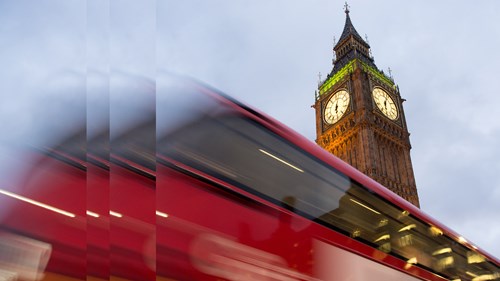Brexit-Ticker
This Brexit ticket will now be discontinued, i.e. following the preliminary “completion” of Brexit. We will inform you shortly in a new format about further developments, in particular about the status of negotiations on future (trade) relations between the United Kingdom and the European Union as well as the associated legal implications.
Spotlight: Brexit
Follow our Brexit News channel for the latest developments and News.
Great Britain has left the European Union
On 31 January 2020 at 24.00 hours, Great Britain left the European Union. According to the exit agreement now in force, which had previously been approved by both the British and the European Parliament, large parts of European law will continue to apply for a transitional period lasting until 31 December 2020. Until the end of the transitional period, which Prime Minister Johnson does not wish to extend, London and Brussels must reach an agreement that will govern the relationship between the two parties in the further future.
Spotlight: Brexit
Follow our Brexit News channel for the latest developments and News.
Editing by:
Giovanna Ventura: giovanna.ventura@noerr.com
Dr Max Helleberg: max.helleberg@noerr.com
16 January 2020
House of Commons votes for withdrawal agreement
On 9th January 2020 the House of Commons voted in favour of the Brexit agreement negotiated by the government which had already gained a majority on 20th December 2018 during the second reading of the law. Now the bill still has to clear several parliamentary hurdles in the House of Lords. However, an approval there is considered certain.
Spotlight: Brexit
Follow our Brexit News channel for the latest developments and News.
Editing by:
Giovanna Ventura: giovanna.ventura@noerr.com
Dr Max Helleberg: max.helleberg@noerr.com
20 December 2019
House of Commons votes in second reading for ratification bill on withdrawal agreement
The House of Commons voted 358 votes in favour, 234 against and 358 votes in favour of the ratification bill presented by Prime Minister Johnson's government at second reading. The House of Commons' approval at second reading should not be confused with the adoption of the Act, which means that the Act cannot enter into force until it does. The final adoption of the law is planned for the beginning of January. Afterwards, the approval of the European Parliament is still required.
The ratification law adopted at second reading excludes any possible extension of the transitional phase following the withdrawal agreement. In addition, compared to the ratification law, which was rejected before the elections, parliamentary control options are limited. Thus, according to the current status of the draft law, the ministers are no longer obliged to inform Parliament about the progress of the talks.
Spotlight: Brexit
Follow our Brexit News channel for the latest developments and News.
Editing by:
Giovanna Ventura: giovanna.ventura@noerr.com
Dr Max Helleberg: max.helleberg@noerr.com
18 December 2019
Johnson intends to rule out extension of transition period beyond 31 December 2020 by law
Johnson announced on Tuesday - as he had already done during his election campaign - a law that would rule out an extension of the transitional period, which would initially run until 31 December 2020. By then a free trade agreement between Great Britain and the European Union should have been negotiated. The withdrawal agreement actually provides for an extension of this transitional phase by up to two years if no trade agreement has been concluded by the deadline. Johnson now wants to modify this regulation at the level of national law. An adjustment of the withdrawal agreement is not necessary because it does not provide for an extension of the transition phase. According to Art. 132 of the Leaving Agreement, the transitional period will only be extended if the Joint Committee, composed of representatives of the European Union and Great Britain, takes a single decision before 1 July 2020 to extend the transitional period by a maximum of one or two years. The Joint Committee can only take decisions by mutual agreement - the extension of the transitional period against the will of the United Kingdom is therefore not possible.
Spotlight: Brexit
Follow our Brexit News channel for the latest developments and News.
Editing by:
Giovanna Ventura: giovanna.ventura@noerr.com
Dr Max Helleberg: max.helleberg@noerr.com
13 December 2019
Tories clearly win House of Commons elections - Johnson announces swift vote on exit agreement
The Conservative Party of the incumbent Prime Minister Johnson has clearly won the lower house elections. It won at least 364 seats, while opposition leader Corbyn's Labour Party won only 203. It is the worst Labour Party result since World War II, losing more than 50 seats. Corbyn declared that he did not want to lead the Labour Party into another election. Scotland's nationalists were the only opposition party to win. Party leader Sturgeon announced she would continue to fight for a new independence referendum in Scotland.
Meanwhile, Prime Minister Johnson has made it clear that he now wants a swift vote on the resignation agreement negotiated by his government with the EU. Johnson intends to implement his country's withdrawal unconditionally from the EU by the end of January 2020.
Spotlight: Brexit
Follow our Brexit News channel for the latest developments and News.
Editing by:
Giovanna Ventura: giovanna.ventura@noerr.com
Dr Max Helleberg: max.helleberg@noerr.com
29 October 2019
House of Commons votes for new elections on 12 December
On October 28th the British House of Commons voted for new elections on 12 December. The largest opposition party, Labour, had abandoned its opposition to Johnson's new election plans after the European Union granted Britain an extension. According to Labour leader Corbyn, the danger of an unregulated Brexit has thus been averted. A law was adopted with 438 votes in favour (20 against) to hold new elections on 12 December. The law still has to be approved by the House of Lords, but this is considered a formality. The law is a (likely legal) circumvention of the British Electoral Act, which requires a two-thirds majority to hold early elections. An application under this electoral law failed on Monday.
According to opinion polls, Labour is currently 24 percent, far behind the Tories with 37 percent. At the same time, the smaller parties such as the Liberals and the Scottish nationalists are predicted to have unusually high shares of the vote in these elections. Should the House of Commons no longer vote for the Brexit agreement negotiated by Prime Minister Johnson before the elections, nor enact the corresponding ratification law, many observers believe that Johnson will present himself as the only reliable guarantor for the implementation and enforcement of Brexit. If, on the other hand, the House of Commons votes for the draft agreement before the elections, he will go to the polls as the "doer" of Brexit. Labour, on the other hand, will try to score points on social issues.
Spotlight: Brexit
Follow our Brexit News channel for the latest developments and News.
Editing by:
Giovanna Ventura: giovanna.ventura@noerr.com
Dr Max Helleberg: max.helleberg@noerr.com
29 October 2019
British House of Commons rejects Johnson's request for early elections
On October 28th the House of Commons rejected Prime Minister Johnson's request to hold early elections on 12 December. 299 MPs voted for the motion, 70 against.
Spotlight: Brexit
Follow our Brexit News channel for the latest developments and News.
Editing by:
Giovanna Ventura: giovanna.ventura@noerr.com
Dr Max Helleberg: max.helleberg@noerr.com
28 October 2019
EU extends deadline until 31 January 2020, but earlier withdrawal possible
As the President of the European Council has just announced on Twitter, the European Union has granted Great Britain a postponement of the withdrawal period until 31 January 2020. However, earlier withdrawal is possible if the UK ratifies the renegotiated withdrawal agreement earlier.
Spotlight: Brexit
Follow our Brexit News channel for the latest developments and News.
Editing by:
Giovanna Ventura: giovanna.ventura@noerr.com
Dr Max Helleberg: max.helleberg@noerr.com
25 October 2019
EU approves extension of deadline in principle
The Heads of State and Government have basically agreed to the British Government's request for an extension of the deadline for resignation, which should have expired on 31 October. The EU ambassadors want to discuss the duration of the deadline extension at the beginning of next week.
Spotlight: Brexit
Follow our Brexit News channel for the latest developments and News.
Editing by:
Giovanna Ventura: giovanna.ventura@noerr.com
Dr Max Helleberg: max.helleberg@noerr.com
25 October 2019
Johnson announces motion on new elections December 12, 2019
Prime Minister Johnson has announced a motion for new elections on December 12. According to British newspapers, he intends to give the House of Commons more time to review the ratification law if the House of Commons also votes for new elections on 12 December 2019. Parliament is due to vote on the bill on Monday 28 October.
Johnson needs a two-thirds majority in the House of Commons for new elections. So far, the largest opposition party, Labour, has rejected new elections. Prime Minister Johnson's Conservative Party is currently well ahead of the Labour Party in polls.
Spotlight: Brexit
Follow our Brexit News channel for the latest developments and News.
Editing by:
Giovanna Ventura: giovanna.ventura@noerr.com
Dr Max Helleberg: max.helleberg@noerr.com
23 October 2019
Majority in House of Commons in favour of the Ratification Act to new Brexit Agreement, but opposed to timetable
Yesterday evening, at the second of a total of three readings, a majority of 329 MPs voted in favour of the ratification law for the new Brexit agreement. 299 deputies voted against. The law has not yet been passed, but the vote is regarded as a very important mood picture: in principle, Prime Minister Johnson seems to have a political majority behind him for the resignation agreement negotiated by his government. In addition to the third reading, which is still pending, the approval of the House of Lords is still required.
At the same time, last night a majority of 308 MEPs voted against the timetable set by the government, which provided for the legislative process to be completed this week. This was considered by many MEPs to be insufficient to assess the impact of the law. A resignation by 31 October is therefore unlikely to be possible. While Prime Minister Johnson said before last night's vote that if his timetable was not met, he would break off the legislative process and seek new elections, there was no question of new elections after the defeat. Rather, Johnson announced that he would "pause" the legislative process and await the decision of the European Union on his application on Saturday to extend the deadline for resignation by three months.
The decisive factor now is how the European Union decides on the request for an extension of the deadline. Council President Tusk has already announced that he will recommend that the European Council grant the requested extension. If the European Council agrees to an extension of the deadline, the House of Commons would probably have sufficient time to deal with both the ratification law and - subsequently - the draft Brexit agreement itself on a parliamentary level. Amendments to the draft Ratification Act have already been tabled which would entail a substantial change to the withdrawal agreement and could only be implemented if the withdrawal agreement were renegotiated. Johnson vehemently rejects such adjustments and consequently renegotiations.
Spotlight: Brexit
Follow our Brexit News channel for the latest developments and News.
Editing by:
Giovanna Ventura: giovanna.ventura@noerr.com
Dr Max Helleberg: max.helleberg@noerr.com
21 October 2019
British Parliament postpones decision on draft withdrawal agreement - Government requests extension of deadline
On Saturday, the House of Commons voted in favour of postponing the vote on the agreement negotiated between the British government and the EU Commission. The so-called Letwin motion - named after MEP Letwin, who tabled the motion - was successful with 320 votes in favour to 306 against and provides for the vote on the agreement to be postponed until the ratification law is passed. The ratification law serves to transpose the withdrawal agreement into national British law and should have followed the political decision on whether to adopt the draft withdrawal agreement as a technical act. Due to the postponement of the vote on the draft withdrawal agreement, the government was forced, on the basis of a recently enacted law, to apply to the EU Commission again for an extension of the deadline for withdrawal. The EU Commission has not yet decided on this application.
The success of the Letwin motion is seen as an expression of the deep distrust of the House of Commons towards the Johnson government. The parliamentarians, according to the reading of many, despite an assumed positive vote on the "whether" of the resignation agreement, want to avoid that deliberate disruptions of the legislative process regarding the ratification law could have led to the fact that this would not have been passed before 31 October. As a result, Britain would have left the EU without any agreement at all, against the will of the House of Commons. By bringing forward the adoption of the ratification law, such torpedoing is no longer possible. At the same time, one could interpret the success of the Letwin motion as a sign that there is in principle a majority for the draft withdrawal agreement. It is reasonable to assume that at least some Members who would like a timely vote on the ratification law will support its content. However, if they support this law, they are very likely to support the draft withdrawal agreement itself. Politically, the two votes are inextricably linked.
This afternoon, the House of Commons spokesman, John Bercow, wants to decide whether the British Parliament will vote again this afternoon on the resignation agreement negotiated between Prime Minister Boris Johnson and the European Union. This was what the government had requested in order to achieve a resignation by 31 October.
Spotlight: Brexit
Follow our Brexit News channel for the latest developments and News.
Editing by:
Giovanna Ventura: giovanna.ventura@noerr.com
Dr Max Helleberg: max.helleberg@noerr.com
18 October 2019
European Council approves draft new withdrawal agreement - vote in House of Commons on Saturday
Only yesterday evening the European Council, in which the heads of government of all member states are represented, approved the draft of a new withdrawal agreement negotiated by the EU Commission and the British government. The House of Commons will vote on the draft tomorrow.
Spotlight: Brexit
Follow our Brexit News channel for the latest developments and News.
Editing by:
Giovanna Ventura: giovanna.ventura@noerr.com
Dr Max Helleberg: max.helleberg@noerr.com
17 October 2019
EU Commission and UK government agree on new draft of withdrawal agreement
As announced this morning, the EU Commission and the UK government have agreed on a new draft of the withdrawal agreement. Current EU President Juncker and UK PM Johnson sought on Twitter consent to the agreement from the EU Council and UK House of Commons. The EU Commission has already published online the revised draft of the agreement, the related, revised political statement and a 64-page document on the significance of the possible agreement to Northern Ireland.
The new draft provides that Northern Ireland remains in a de facto customs union with the EU for the next four years. Certain EU regulations are intended to apply to goods in Northern Ireland. Customs checks would become necessary between Northern Ireland and Great Britain. For certain products, exceptions to this rule are planned. UK authorities would handle the collection of duties and the checking of EU rules for products supplied to Northern Ireland from third countries and which may be transported into the Republic of Ireland without further checks. For products where this is not the case, the authorities would apply UK customs duties. Since, in the event of the withdrawal agreement coming into force, Northern Ireland would no longer legally be part of the customs union, it could benefit from trade agreements between the UK and third countries. After four years, according to the draft, the de facto customs union could be cancelled by Northern Ireland, provided that the Northern Irish government and parliament support this. In such a case there would be a further transitional phase of two years. The UK also assures in the draft that it will not undercut the environmental and social standards of the EU.
Current EU President Juncker recommended that European government heads agree to the new draft. The European Council will sit in Brussels today and on Friday. Some government heads such as French President Macron and Dutch Prime Minister Rutte, as well as the foreign minister of the Republic of Ireland have already said they would agree to the draft. However, the consent of the UK parliament still appears completely open; it will probably vote on the deal on Saturday. The Northern Irish DUP, which currently supports PM Johnson and vociferously supports as close as possible a connection between the largely protestant Northern Ireland and Great Britain has already said it will vote against the deal. Opposition leader Corbyn also spoke out against the deal: the new draft is worse than Ms May’s deal, he said. He also said his party would vote against the agreement. Jo Swinson, head of the Liberal Democrats, called again for a second referendum – which obviously needs to be interpreted as a rejection of the draft. Finally, the Scottish nationalists led by Nicola Sturgeon said they would vote against the draft. Nigel Farage, leader of the Brexit Party not represented in the House of Commons called for a no-deal Brexit.
It is not yet foreseeable whether a technical postponement of Brexit can be avoided if the Euro-pean Council and House of Commons vote for the draft deal by Saturday. EU chief negotiator Barnier thinks a managed exit is feasible by 31 October.
Spotlight: Brexit
Follow our Brexit News channel for the latest developments and News.
Editing by:
Giovanna Ventura: giovanna.ventura@noerr.com
Dr Max Helleberg: max.helleberg@noerr.com
4 October 2019
British government makes new proposals on border regime in Ireland - cautious reactions
On Wednesday 02 October 2019, Prime Minister Johnson sent proposals to the EU on the future border regime in Ireland. These proposals initially continue to require the UK to leave the EU on 31 October 2019, with the result that customs controls would be reintroduced at the Irish border. However, these would not be physically carried out at or near the border, but would be carried out locally at traders' premises using electronic controls. In addition, Johnson proposed that the EU rules for goods in Northern Ireland should continue to apply for at least four years after the end of the transitional period (probably at the end of 2020). This is subject to the approval of the Northern Ireland Government and Parliament during the transition period. Johnson plans that the government and parliament in Belfast will then be able to vote every four years on a (further) extension of the EU's commodity regime.
The current President of the European Commission, Juncker, welcomed Johnson's determination, but at the same time expressed his concerns about the proposals, which contained "some problematic points". In particular, Juncker called for the "Backstop" solution to maintain its objective of preventing a hard border between Ireland and Northern Ireland. The balance of the Good Friday Agreement must be maintained. Steffan Seibert, spokesman for the federal government, described Johnson's proposals this morning as an "important step". Now it is up to the EU Commission to evaluate the concrete plans. In any case, the integrity of the EU internal market must be preserved and a reintroduction of hard borders must be avoided.
Spotlight: Brexit
Follow our Brexit News channel for the latest developments and News.
Editing by:
Giovanna Ventura: giovanna.ventura@noerr.com
Dr Max Helleberg: max.helleberg@noerr.com










